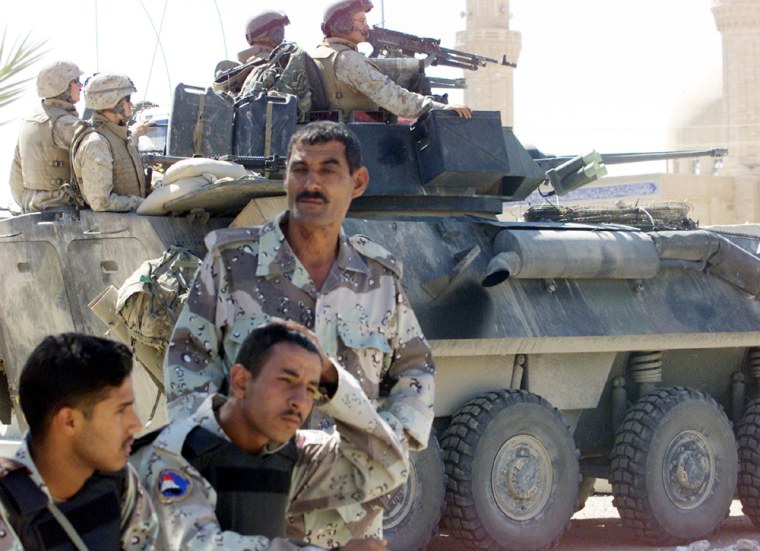A senior U.S. military commander acknowledged Friday that he almost abandoned efforts several times to have an Iraqi security force led by former Iraqi army officers safeguard this city but decided to persevere when the group known as the Fallujah Brigade showed signs that it might succeed.
"We've been prepared to pull the plug three or four times, but each time we are, we detect a faint heartbeat," the commander said in remarks made to Deputy Defense Secretary Paul D. Wolfowitz during a briefing at the headquarters of the 1st Marine Expeditionary Force. The commander could not be identified under the terms by which reporters traveling with Wolfowitz were permitted to attend the briefing.
The commander's remarks reflected deep frustration among U.S. officials over partnering with Iraqi soldiers.
The Fallujah Brigade was established last month after several weeks of fighting between insurgents and the U.S. Marines responsible for securing this volatile region west of Baghdad, in the Sunni Triangle. As the Marines withdrew to the outskirts of the city, the all-Iraqi unit -- led by officers who served under former president Saddam Hussein and comprising some of the same guerrillas who had fought U.S. forces here -- was given the task of bringing peace to Fallujah and meeting several other U.S. demands.
Some hailed the approach as a model for making security in Iraq a "shared responsibility," as President Bush put it at the time. Others decried it as a poorly devised compromise cobbled together largely at the behest of Sunni Muslims on the now-disbanded Iraqi Governing Council. Those council members strongly opposed more aggressive U.S. military action in Fallujah.
While attacks on the Marines have dropped off, masked insurgents have returned to the streets of the city. Not only has the brigade failed to disarm the militants, it has made little evident progress in capturing foreign guerrillas known to have taken refuge in the city or in apprehending the killers of four American security contractors whose bodies were burned and mutilated in March. U.S. authorities worry that Fallujah remains a sanctuary for bombmaking and other insurgent activity.
A temporary fix
"The Fallujah Brigade was a Band-Aid to create a cease-fire," said a senior official in Wolfowitz's delegation. "It has to be viewed as a temporary fix."
But Marine commanders, who negotiated the deal, have been reluctant to declare it over, noting a lack of good alternatives.
"Every time we're at our wits' end" with the brigade, the senior commander told Wolfowitz, it makes a "small step forward." As long as that continues, he added, "we're willing to give it a chance."
Among the encouraging signs, a senior Marine officer said, were a series of sustained firefights over the past few nights in which members of the Fallujah Brigade engaged insurgents in the city.
In an interview, Wolfowitz said the commander's reference to pulling the plug was not meant as a possible return to U.S. military action in Fallujah but as some kind of nonmilitary move that would demonstrate U.S. displeasure with the brigade.
"We're making progress," Wolfowitz said. "I think at least for the time being, that's a good thing."
Gen. Mohammed Abdullah Mohammed Shehwani, who heads Iraq's National Intelligence Service, assured Wolfowitz during a separate meeting here Friday that the brigade would move to rid Fallujah of foreign fighters within two weeks. He strongly advised against renewed U.S. military attacks in Fallujah.
"We succeed in Fallujah," Shehwani said in somewhat halting English. "I think they should make this solution" a model for other Iraqi cities.
Shehwani, who helped set up the brigade, estimated the number of foreign fighters in Fallujah at 50. U.S. officials here said that number was low. Wolfowitz asked what Shehwani knew about the whereabouts of Abu Musab Zarqawi, a Jordanian with links to al Qaeda whom U.S. officials suspect of masterminding recent attacks in Iraq, including some of the violence in Fallujah.
Shehwani said Zarqawi was no longer in Fallujah and mentioned several other cities that he said the Jordanian had visited in recent days. "Today, we hear he's in Kirkuk," the general said. U.S. officials said they were skeptical about the statement.
According to an official in Wolfowitz's delegation, U.S. authorities narrowly missed capturing Zarqawi about a month ago at a safe house in western Iraq used by the country's former secret police.
As problematic as Fallujah remains for U.S. authorities, Marine commanders said they were more concerned about the worsening security situation in Ramadi, the provincial capital, where Iraqis have been assassinated with increasing frequency. The slayings are viewed as part of a nationwide campaign by insurgents to unnerve Iraqis before the planned transfer of limited power at the end of the month and the move to elections next year.
